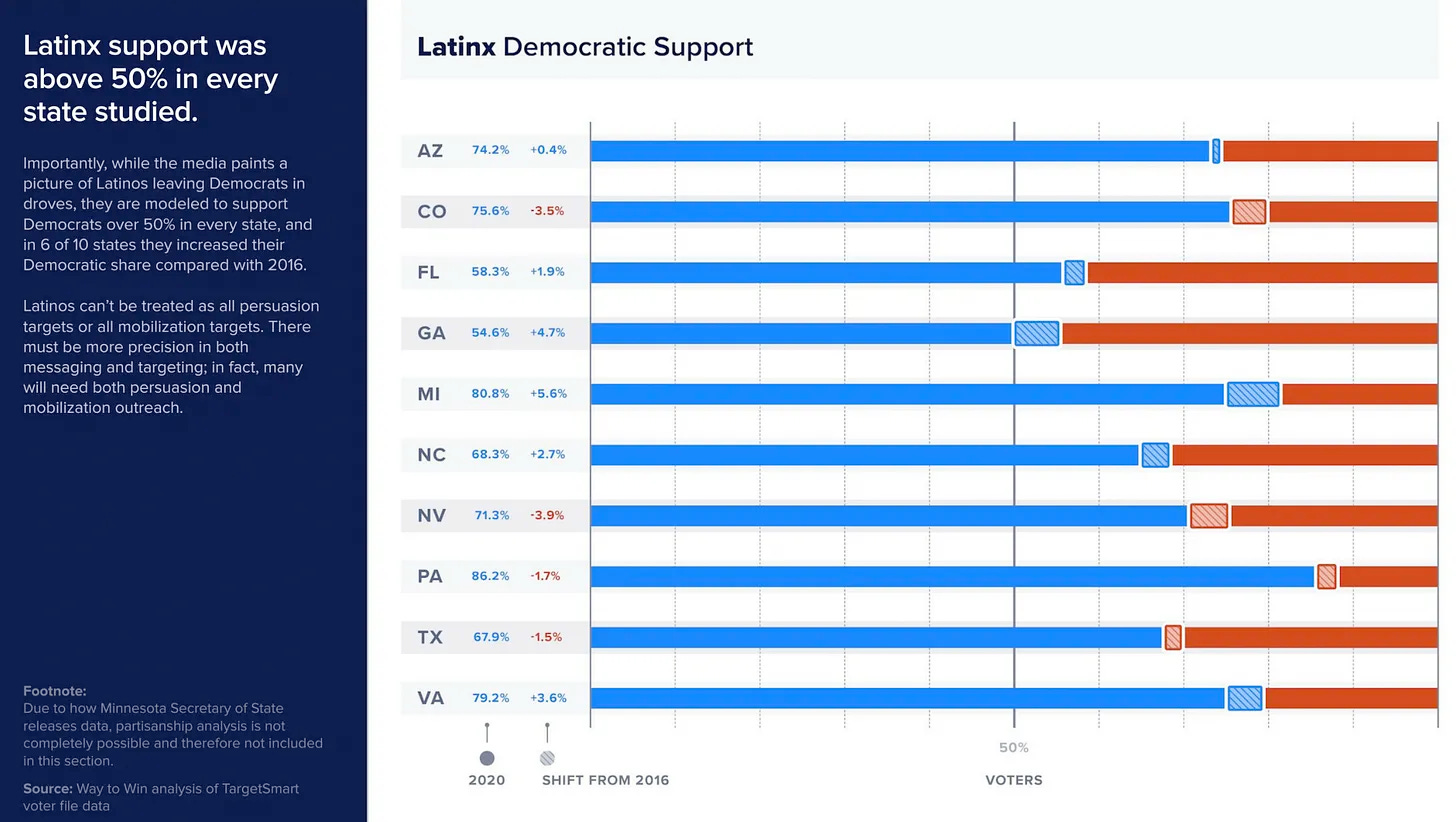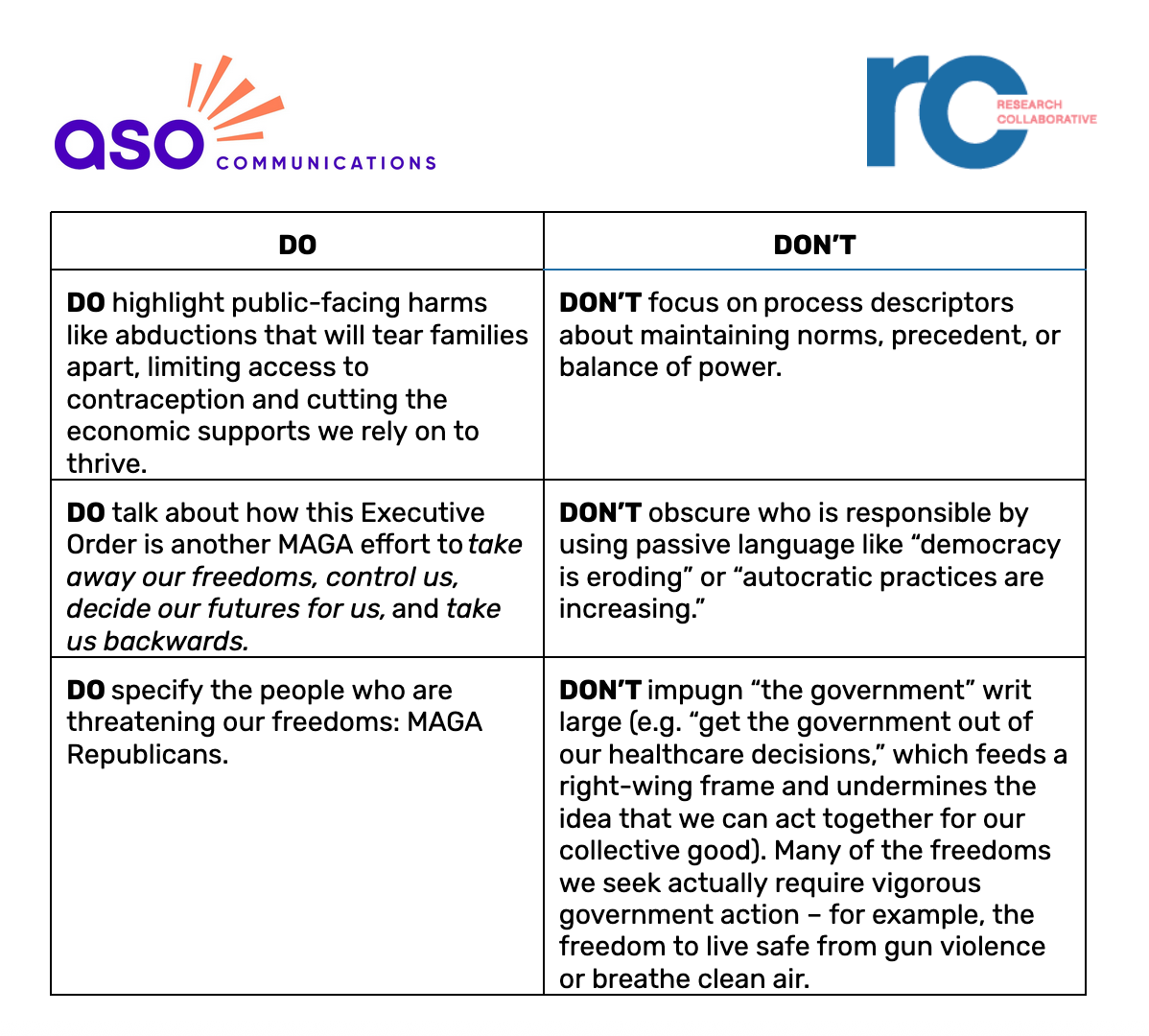Persuasion 2025: Unpersuasive
Shoddy analysis and utterly unpersuasive message guidance
Persuasion 2025, a gathering of “progressive politicians and strategists” that “will call on Democrats to take a more leftward path out of the political wilderness,” was featured in Politico yesterday.
Hosted by the “liberal donor group” Way To Win, the event was described as “the progressive answer to WelcomeFest.”
Look, I am a little bit biased here: I presented at the inaugural WelcomeFest in 2024.
But I also happen to know a thing or two about Way to Win and the consulting firm behind their theory. I think it would be a mistake for Democrats to follow their advice.
I first came across Way To Win in this article by Ron Brownstein in The Atlantic, which discusses their postmortem report.
One thing immediately jumped out at me: according to the report, Joe Biden improved on Hillary Clinton’s vote share with Latino voters by two percentage points — in Florida.
What’s going on is that these visualizations are based on modeled partisanship scores — basically, you take a voter file and use demographic and other data (such as whether or not someone has a hunting license) and have the computer take an educated guess at how likely they are to be a Democrat.
The problem is that this analysis doesn’t pass the smell test. What happened is that a lot of Latinos who were modeled as Democrats did turn out but voted for Trump. You can figure this out by taking a cursory glance at the 2016-2020 swing map in Florida and Texas; or by looking at Catalist’s postmortem report; or by having paid even the slightest amount of attention to the news coverage right after the 2020 election, in which Trump’s gains with Latinos were widely discussed.
The fact that Way To Win still put these obviously incorrect numbers in their report should raise serious questions about the quality of their analysis and their level of epistemological rigor.
I happen to be on the mailing list for the ASO Communications, the firm by Persuasion 2025 speaker Anat Shenker-Osorio. She distributes messaging documents telling people how they should talk about Republican policies, ostensibly with the goal of persuading people that the policies are bad and that they should vote for Democrats. I say “ostensibly” because I don’t think they’re particularly persuasive.
The home page on the ASO Communications website says that “our messages must persuade the middle while also energizing the base.”
Here is the complete “Freedom Over Fascism Toolkit” document. Take a look at some of their messages and think about whether they’re actually persuasive to people who are not partisan, progressive Democrats.
On the looming government shutdown, ASO recommends calling the Republican continuing resolution the “MAGA Murder Law to devastate American families” and suggests “We will not enable the hostile takeover of our government”1 as a sample talking point (pages 4-5).
On the Trump administration’s deportations of student protesters, ASO says not to say “this is not who we are” because this “both abstract and erases the experience of many Americans, from enslavement to the many people the regime has abducted in just the past few months” (pages 6-7).
On Trump’s executive orders, ASO instructs people not to use phrases like “get the government out of our healthcare decisions,” because such language “feeds a right-wing frame and undermines the idea that we can act together for our collective good” (page 11).
On the Supreme Court, ASO tells people not to “affirm right-wing framing like ‘rule of law’” or “reference ‘co-equal branches’ or ‘Constitutional authority’ to argue for Congress’s role” (page 18).
I was under the impression that “rule of law” is an American idea and not a right-wing idea, but I guess that’s me giving into problematic framings.
Again, don’t take my word for it. You can read the whole document here.
Message guidance that puts “Constitutional authority” in scare quotes, calls “rule of law” a right-wing framing, and tells people that it’s problematic to call attacks on civil liberties un-American will not persuade people who voted for Trump to pull the lever for a Democrat in 2026.2
But these are the districts we need to win if we want to win the House majority.
The first piece of copy on the ASO Communications website reads:
Conventional wisdom says to meet people where they are. But, on most issues, where they are is unacceptable. Applying tools from cognition and linguistics, we uncover where people are capable of going and how to use our words, images and stories to move them.
That, I think, is the crux of the problem: Persuasion 2025 starts from the premise that, when considering people who need persuasion, “where they are is unacceptable.”
In a recent podcast appearance, Ezra Klein pointed out that for most voters, “the fundamental question in politics is not if you like the politician,’ it’s ‘does the politician like you? Does this political movement like you? Are they going to back you up?’ And if they are sending every signal that they don’t, it’s pretty reasonable to not vote for them.”
Politics is a game of addition. It’s about meeting people where they are, not where you want them to be. But if the first thing on your website says that where people are is “unacceptable,” it’s going to be hard to make them think you respect them.
Because you don’t.
One might ask how a duly-elected Republican trifecta passing a continuing resolution constitutes a “hostile takeover” and not “the result of a free and fair election that the Democrats lost.”
Frankly, it’s not even persuasive to this Massachusetts liberal






Nice piece, Milan. I like the length because it just makes one simple but interesting point, and it’s short enough for my brainrot.
Thank you for this concise and informative article. I immediately went to the ASO Communications website to see for myself if someone could be so smug and misguided as to announce that "where they are is unacceptable" — and apparently it changed at some point in the seven days since you published this. It now reads
"Conventional wisdom says we should meet people where they are, but research shows there is no one place that people “are.” When we meet them at a place of widely held values, we can move them toward more progressive solutions."
What is up with this?
Thank you again for the valuable article.